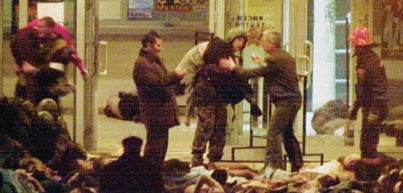Terror in Moscow (Page 2)
Psychological Torment
In 57 Hours, Nedkov provides an honest account of the wild emotional swings he experienced. Initially came disbelief that this could actually happen, followed by despair for the life he was absolutely certain he was to lose, and anger.
"How could these people just take away the rest of my life?" he shakes his head now. "All my ambitions, everything I ever dreamed, what I'd worked for. Also, I felt so sad for those who would suffer on account of my death - my wife, mother, brother."
A surreal incident occurred during the second night when a 26-year-old woman who lived nearby walked into the theatre and began berating the hostages for not resisting their tormentors. Apparently, she was incensed by the effrontery of their violating this place, where she'd attended music classes. She was promptly taken out into the hallway, where one of the terrorists gunned her down. This was the moment, Nedkov says, when "I knew our survival would not be thanks to their mercy."
At one point, the terrorist leader ordered everyone to gather around a huge bomb that had been positioned in the middle of the theatre. Had they set it off, all would have been instantly obliterated. Instead, their captors burst into laughter after a few minutes of this psychological torment and dismissed them back to their seats.
Nedkov entertained fantasies of overpowering the terrorists, absurd moments when he could envision making a daring move. The woman closest to him was armed with a Makarov, a gun with which he had trained during his service in the Bulgarian army. But rationality overcame him. What could he really accomplish before being killed and likely causing others to die as well?
So, he waited, lost in his own thoughts, regrets and increasingly faint hope. Hence, an incident that played out so publicly was, for each of the hostages caught in its grip, very personal and intimate.
Even between himself and Irina there was mostly silence. Thanks to the quality of her English, he managed to keep her with him by passing her off as his Canadian wife, on the assumption that would win her more favourable treatment. In the end, she, too, survived.
Nedkov has no memory of being rescued. Along with everyone else in the theatre, he was knocked unconscious by the mysterious gas that the Special Forces pumped in through the ventilation system before storming the building and methodically killing each terrorist. In the event, it was two hours before the hostages were evacuated, leading him to speculate that the security services were more determined to liquidate the terrorists than save the hostages. When they were finally extracted, not enough medical personnel were on site to minister to them. Furthermore, the authorities were tight-lipped regarding the nature of the gas employed. Notwithstanding formal requests from American officials, Russia has withheld the name of the agent. It is widely believed to be some derivative of Fentanyl, a synthetic narcotic with heroin-like properties, only far greater potency.
Throughout the ordeal, Nedkov had made a point of placing himself as close to an exit as possible. He feels this saved him because he was surely among the first out. Nonetheless, he writes, hauntingly, "No pattern can be found in the matter of who lived and who died."
Extensive medical tests have since revealed no residual damage from the gas he inhaled during the rescue operation.
Only after we'd been talking for nearly an hour did it finally occur to me how difficult it might be for him to be quizzed about what he endured. He smiles graciously and says, "A therapist I saw while recovering in the hospital said that speaking about these things is the best way to get over them."
He began work on his book only three months after the crisis, in January 2003. At the outset, the process was very painful, demanding that he dredge up memories that had otherwise faded from his consciousness. But he was resolved to bear witness, to tell the story on behalf of those who had perished. It sounds like a cliché, but he found the effort very healing.
In February, Nedkov returned to Moscow to interview other survivors and to finally see Nord-Ost to its finale. Fittingly, he went with Irina, as well as his co-author - the writer and editor Paul Wilson - and his wife. "This was a symbolic act for me," he says, "proof to myself that the terrorists couldn't take control over my life."
As he entered the theatre, he was filled with anxiety. Until the curtain rose, he found himself scanning the theatre, looking for...what? Any sudden, disturbing movements? Chechens in ski masks? Women in hijabs with bomb-laden belts? Once the play began, however, he relaxed and now even jokes that it was much better the second time.

Security personnel evacuate hostages following the Special Forces raid.


